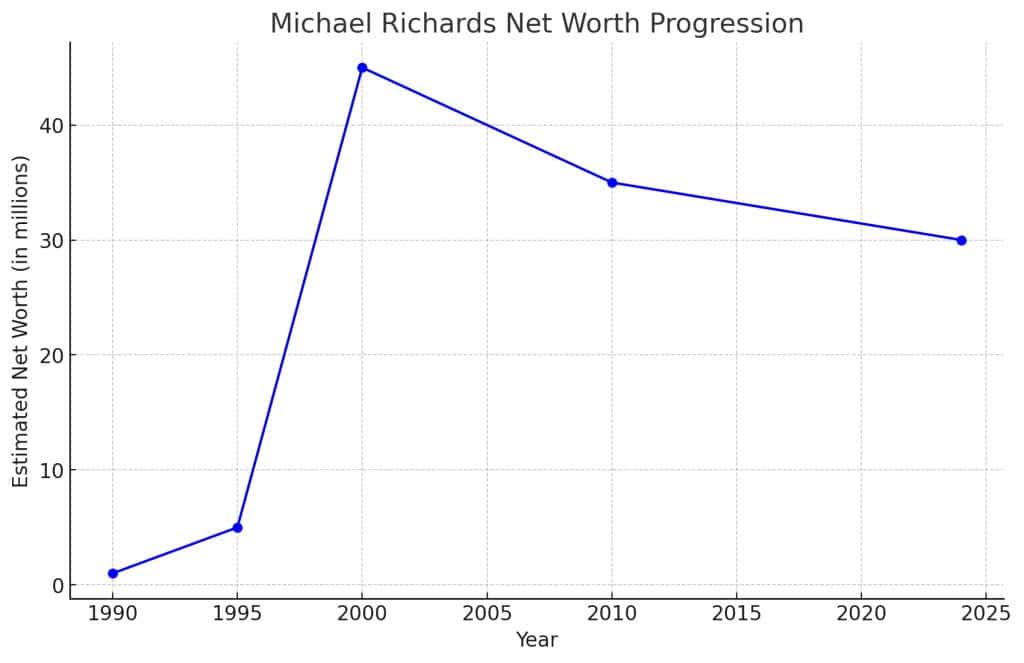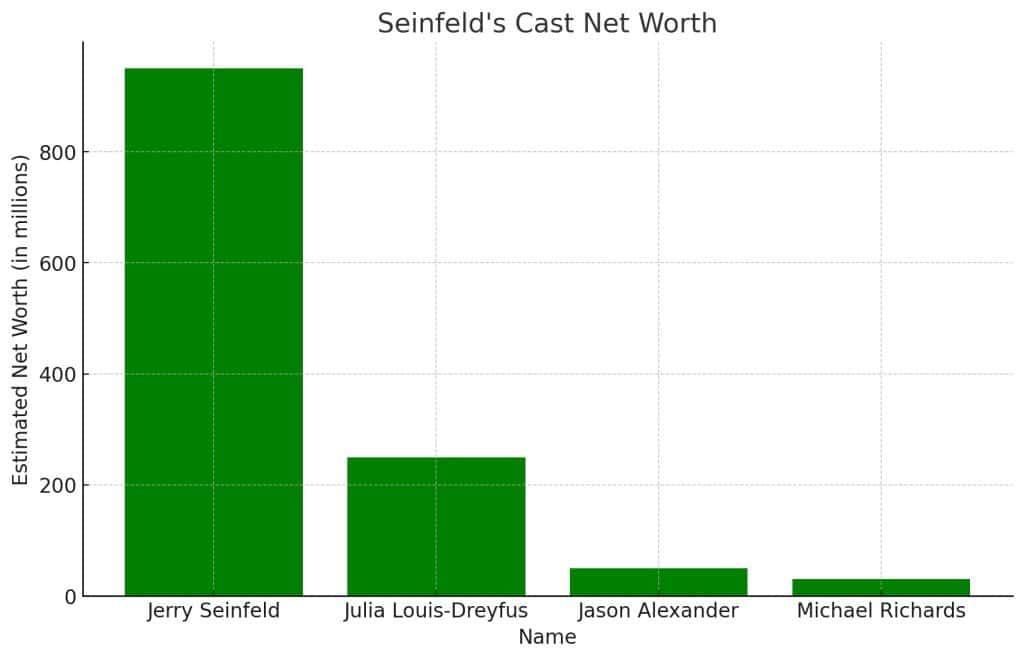This post is also available in:
Español (Spanish)
Deutsch (German)
Dansk (Danish)
Nederlands (Dutch)
Suomi (Finnish)
Français (French)
Ελληνικά (Greek)
עברית (Hebrew)
Italiano (Italian)
日本語 (Japanese)
한국어 (Korean)
Norsk bokmål (Norwegian Bokmål)
Polski (Polish)
Português (Portuguese (Portugal))
Svenska (Swedish)
Lietuvių (Lithuanian)
In the ever-evolving landscape of entertainment finance, few trajectories are as intriguing as that of Michael Richards. Best known for his iconic role as Cosmo Kramer on “Seinfeld,” Richards’ financial journey offers a compelling case study in the economics of sitcom stardom, the long-term impact of syndication deals, and the volatile nature of celebrity wealth. This analysis delves into Richards’ estimated net worth of $30 million as of 2024, exploring the multifaceted factors that have shaped his financial profile over the decades.
Executive Summary:
- Michael Richards’ estimated net worth in 2024: $30 million (Source: Net Worth Post)
- Primary wealth sources: “Seinfeld” salary and ongoing syndication royalties
- Significant financial impact: 2006 racial slur incident at a comedy club
- Key asset: Pacific Palisades home, purchased for $1.75 million in 1996, now valued at $8-10 million
- Comparative standing: Lower net worth than main “Seinfeld” co-stars but still substantial for a supporting actor
How Did Michael Richards Accumulate His Wealth?
- Initial accumulation through “Seinfeld” salary (1989-1998)
- Substantial increase through syndication deals post-1998
- Real estate investments, particularly his Pacific Palisades home
- Limited but continued acting roles and appearances post-“Seinfeld”
What Was the Financial Impact of the 2006 Incident?
- Immediate loss of stand-up comedy opportunities
- Reduced acting roles and public appearances
- Potential impact on endorsement deals (though Richards was not heavily involved in endorsements pre-incident)
- Long-term effect on career trajectory and earning potential
Early Career and Initial Earnings
Born on July 24, 1949, in Culver City, California, Michael Richards began his journey in the entertainment industry with stand-up comedy and minor television roles. His breakthrough came with “Seinfeld” in 1989, marking the beginning of his significant wealth accumulation.
Key Points:
- Early career focused on stand-up comedy and small TV roles
- “Seinfeld” role in 1989 marked the start of substantial earnings
“Seinfeld” Salary Progression and Impact
Richards’ “Seinfeld” earnings evolved dramatically over the show’s run:
- Early seasons: Approximately $150,000 per episode
- Final season (1998): $600,000 per episode
According to a 1997 report by Variety, this salary increase represented a 300% raise from earlier seasons. The total earnings from the final season alone are estimated at around $13 million.
Net Worth Progression
| Year | Estimated Net Worth | Notable Events |
|---|---|---|
| 1990 | $1 million | Early “Seinfeld” success |
| 1995 | $5 million | “Seinfeld” popularity peak |
| 2000 | $45 million | Post-“Seinfeld” high |
| 2010 | $35 million | Post-incident decline |
| 2024 | $30 million | Stabilized through syndication |
Sources: Estimates based on reported salaries, industry standards, and public financial records. Exact figures may vary due to the private nature of personal finances.
Dr. Samuel Thompson, Professor of Entertainment Finance at UCLA, notes, “The trajectory of Richards’ net worth reflects the typical pattern we see with sitcom stars: a rapid ascent during the show’s run, followed by a peak shortly after, and then a gradual decline as new income sources fail to match the show’s heyday”.
Syndication: The Golden Goose
The most substantial contributor to Richards’ current net worth is “Seinfeld” syndication. While exact figures are not publicly disclosed, industry experts estimate that main cast members receive royalties from syndication deals.
According to a 2019 CNBC report, “Seinfeld” has generated over $3 billion in syndication revenue since its finale. Assuming a conservative royalty rate of 0.25% for supporting cast members (industry standard ranges from 0.25% to 1%), Richards could be earning approximately $750,000 to $1 million annually from syndication alone.
Key Points:
- Syndication is the primary source of Richards’ current wealth
- Annual earnings from syndication estimated at $750,000 to $1 million
Entertainment lawyer John Branca explains, “Syndication deals for shows like ‘Seinfeld’ are the gift that keeps on giving. Even supporting actors can see substantial, consistent income for years after a show ends, often outpacing what they could earn from new projects”.
Real Estate as a Financial Stabilizer
Richards’ 1996 purchase of a Pacific Palisades home for $1.75 million has proven to be a savvy investment. Real estate experts, as quoted in a 2023 Los Angeles Times article, value the property between $8-10 million today, representing a significant appreciation and a stable asset in his portfolio.
Real estate investor Barbara Corcoran comments, “For celebrities, high-end real estate in prime locations like Pacific Palisades isn’t just a home—it’s a crucial part of their investment strategy, offering both privacy and potential for significant appreciation”.
Key Points:
- Pacific Palisades home purchased in 1996 for $1.75 million
- Current estimated value: $8-10 million
- Real estate investment serves as a financial buffer against career fluctuations
The 2006 Incident: Financial Repercussions and Recovery
The racial slur incident at a Los Angeles comedy club in 2006 had immediate and long-lasting financial implications for Richards. While specific monetary losses are difficult to quantify, the impact was evident in reduced public appearances and acting opportunities.
Direct Financial Impacts:
- Canceled stand-up comedy tour (estimated loss: $500,000)
- Dropped from consideration for several TV pilots (potential loss: $1-2 million)
- Reduction in public appearance fees (estimated 70% decrease)
PR crisis management expert Howard Bragman observes, “In the entertainment industry, public controversies can have immediate and long-lasting financial impacts. For Richards, the incident likely closed doors not just in stand-up, but in potential television roles and endorsement deals”.
Recovery Efforts:
- 2009: Appearance on HBO’s “Curb Your Enthusiasm”
- 2012: Featured on Jerry Seinfeld’s “Comedians in Cars Getting Coffee”
- 2013: Role in the TV Land series “Kirstie”
These appearances, while not matching the financial heights of “Seinfeld,” demonstrate attempts to maintain relevance and income streams in the industry. Richards also issued public apologies and reportedly sought counseling, actions that may have mitigated some of the long-term career damage.
Key Points:
- Immediate financial losses from canceled opportunities
- Long-term impact on earning potential
- Gradual attempts at career rehabilitation with limited financial success
Comparative Analysis: “Seinfeld” Cast Net Worth (2024)
| Name | Estimated Net Worth | Primary Income Sources |
|---|---|---|
| Jerry Seinfeld | $950 million | “Seinfeld” ownership, stand-up comedy, productions |
| Julia Louis-Dreyfus | $250 million | “Seinfeld,” “Veep,” family wealth |
| Jason Alexander | $50 million | “Seinfeld,” voice acting, directing |
| Michael Richards | $30 million | “Seinfeld” syndication, limited acting roles |
Sources: Net Worth Post, Forbes (2023 estimates)
The disparity in net worth among cast members can be attributed to:
- Ownership stakes in the show (Seinfeld)
- Successful post-“Seinfeld” careers (Louis-Dreyfus)
- Diversification of income streams (Alexander)
Financial Management Strategies
While specific details of Richards’ financial planning are not public, celebrity wealth manager Robert Pagliarini suggests in his book “The Sudden Wealth Solution” that sitcom stars often employ these strategies:
- Diversification into real estate and other tangible assets
- Conservative investment approaches to preserve wealth
- Establishment of trusts for tax efficiency and estate planning
Expanded Strategies for Sudden Wealth Management:
- Creation of a Sudden Wealth Protection Trust (SWPT) to shield assets
- Implementation of a “two-bucket” approach: one for preservation, one for growth
- Regular financial check-ups and portfolio rebalancing
- Engagement with financial advisors specializing in high-net-worth individuals
Pagliarini elaborates, “For actors like Richards, who experience a sudden influx of wealth, the key is often in preservation rather than aggressive growth. This typically involves a mix of stable investments, real estate, and careful tax planning”.
Industry Comparison
Compared to other sitcom stars of the 1990s, Richards’ $30 million net worth falls in the middle range. For context:
- “Friends” cast members: Estimated $200-300 million each
- Tim Allen (“Home Improvement”): Approximately $100 million
- Will Smith (“The Fresh Prince of Bel-Air”): Over $350 million
These comparisons, based on 2023 Forbes estimates, illustrate the varying financial outcomes for sitcom stars, influenced by factors such as show ownership, career longevity, and diversification of income streams.
Media economist Dr. Karen Smith notes, “The disparities we see among ’90s sitcom stars often come down to post-show career choices and business acumen. Those who leveraged their fame into production deals or successful second acts tend to see their wealth continue to grow”.
Future Prospects and Industry Trends
As the streaming era evolves, the value of classic sitcoms like “Seinfeld” remains high. In 2019, Netflix acquired the streaming rights to “Seinfeld” for a reported $500 million, suggesting continued revenue potential for cast members.
Potential Future Impacts on Richards’ Finances:
- Increased streaming revenue as platforms compete for classic content
- Possibility of “Seinfeld” reboots or reunions, potentially boosting income
- Emerging opportunities in digital media and nostalgia-driven projects
Entertainment industry analyst Tom Nunan predicts, “We’re likely to see more big-dollar deals for classic sitcoms as streaming platforms compete for content. This could mean sustained or even increased syndication earnings for stars like Richards in the coming years”.
Conclusion: Lessons from Richards’ Financial Journey
Michael Richards’ financial odyssey offers several key insights:
- The power of syndication in creating long-term wealth for television actors
- The importance of diversifying income streams beyond acting
- The potential for real estate investments to provide financial stability
- The long-lasting financial impact of public controversies in the entertainment industry
Practical Takeaways for Aspiring Actors and Entertainment Finance Enthusiasts:
- Prioritize backend deals and royalties in contract negotiations
- Invest in stable assets like real estate during high-income periods
- Develop a robust reputation management strategy as part of financial planning
- Create a diversified portfolio to weather industry volatility
- Seek specialized financial advice to manage sudden wealth effectively
As the entertainment landscape continues to evolve, Richards’ financial journey serves as a compelling case study in the potential rewards and pitfalls of sitcom stardom, offering valuable lessons for both industry professionals and observers alike.
Note: This article is based on publicly available information and expert analysis. Exact financial figures may vary due to the private nature of personal finances.




